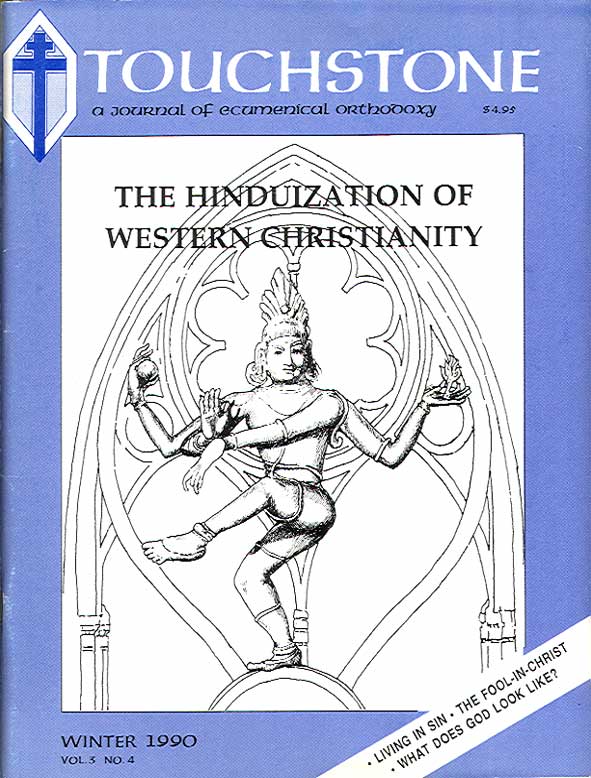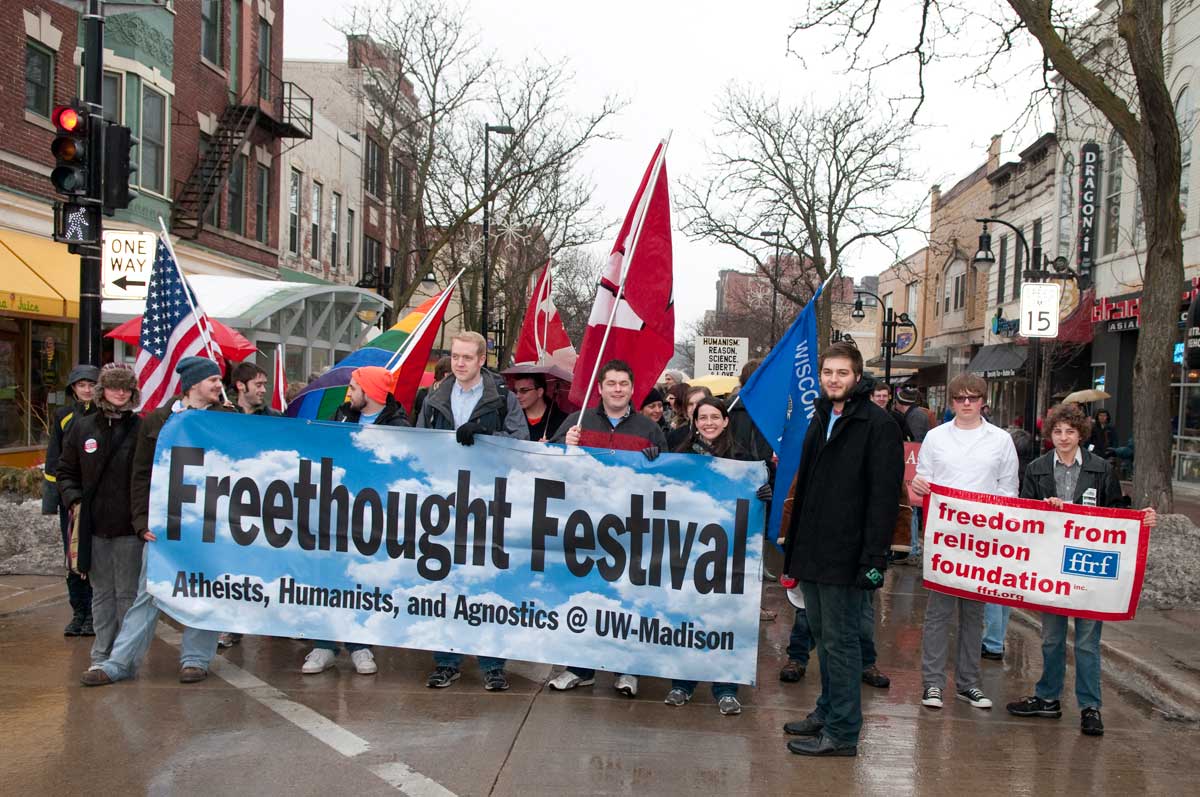Spirituality, Religion & Christian Faith
by S. M. Hutchens
After a mass presided over by a friend in the priesthood I was able to meet and briefly speak to the young man who had assisted him. Charlie impressed me as learned, well-spoken, and sincere. I was inclined to agree that he was a likely candidate for holy orders. This, indeed, is what he aspired to, and was gaining exposure to the inner life of the Church under my friend’s guidance. In a year or so, however, I learned that Charlie no longer professed exclusive allegiance to the Christian faith. What had attracted him to the Mass in the first place, he said, was something that he now recognized as common to all religions, which was available in many places and was not the sole province of Christianity. Somewhere along the line Charlie had developed the conviction that what he had really been interested in all along was not Christianity itself but the “spirituality” which the ancient liturgies conveyed to him through Catholicism’s symbolic and liturgical life. This he now understood to be the common element of every religion—or, more precisely, every spirituality, whether professedly religious or not. He could henceforth find what he sought anywhere he sensed its presence—in the Catholic Mass, the enthusiasm of Evangelicalism and the Charismatic movement, in Quaker and Buddhist quietism, in Mozart and mantra, each in its own way and measure.
Spirituality seems a popular commodity these days. The term is coming increasingly into common use as a shorthand designation for the most meaningful and significant quality of the life of the human spirit. The concept no doubt reflects to some degree our age’s impatience with overt expressions of dogma and a corresponding preference for the “soft” or affective aspects of religious life and thought as over against the “hard” intellective and doctrinal part. The idea of spirituality, moreover, conveniently serves to represent the religious attitude found in every faith, whatever differences may exist between official credos. The Paulist Press Classics of Western Spirituality series, a “library of the great spiritual masters” with a stellar editorial board, includes among its representatives of spirituality writings as diverse as those of William Law, Emmanuel Swedenborg, and the Zohar of the Spanish-Jewish Kabbalah. Fuller Theological Seminary, founded in 1947 as the academic flagship of American neo-Evangelicalism, advertises to prospective students that it will train them in “both scholarship and spirituality.” There is still some reason to doubt that Fuller has consciously abandoned its distinctively Evangelical piety or is now attempting to train its students in generic spirituality of the sort the Paulist Press editors have in mind. One might be justifiably curious, however, whether this use of “spirituality,” combined with Fuller’s well-chronicled openness to various trends of doctrine and practice, serves to illustrate a heightened susceptibility in relatively rootless and heterogenous Christian groups to a concept of spirituality, rather than doctrine or tradition, as a unifying force.
But whence the appeal to Roman Catholics and others from the older and more integrated churches? Perhaps they too are attracted by the beauty and power of the concept of spirituality which I am attempting to define in this article, a concept which presents itself as able to do nothing less than bind estranged humanity together under a single religious idea, to perform a task at which the Christian Church, with its dogged insistence on conversion over convergence, has hitherto failed.
I don’t think Charlie would disagree with me if I identified this “spirituality” as the common name given at present to the outworking of humanity’s primal religious instinct, the phenomenon most frequently identified simply as “religion” in the post-Enlightenment West. Where Charlie and I would disagree is on the neutrality or even, as he apparently feels, the benignity of the realm in which this spirituality functions and to which it professes to point. In order to become “spiritual,” Charlie has very deliberately stepped outside of Christianity and forced himself to un-learn much of what it tried to teach him. In particular he has chosen to forget that the spiritual world is less like a park where sheep may safely graze on anything that meets their fancy than a battleground which contains real enemies and upon which men hazard their eternal souls.
To be sure, there is something like a “religious” mind which is common to all humanity, which may even perhaps be provisionally described by Schleiermacher’s very distinctive notion of Gefühl 1 (a concept which accords well with that of spirituality). But we must emphatically part company with Schleiermacher and liberal theology in general when they identify this consciousness as being in relation with God if this is not the God revealed to the Church through the Lord Jesus Christ and his apostles. No one reaching the level of reflection demonstrated in the Glaubenslehre 2 can pretend that he has not come to his opinions through a process of intense critical interaction with traditional Christian doctrine. Schleiermacher’s world-view, despite its appearance of phenomenological purity (as if it were the result of purely objective reflection on the way things are) is the product of a very deliberate refinement of Christianity which goes beyond the historical faith and has become its judge. The continuing significance of this “Herrnhuter 3 of a higher order” in Protestantism is that he stands as a perduring symbol of what is now called “spirituality” and the unsurpassable prophet of the universalized religion which follows it.
A similar if not identical bent of mind may be found among the fathers of American religious liberalism. The Unitarian divine Theodore Parker, in an address delivered in Boston in 1841, identifies the transient element of Christianity as “forms and doctrines,” the permanent part with “the divine life of the soul, love to God, and love to man.”
The doctrines that have been connected with Christianity, and taught in its name, are quite as changeable as the form. . . . Now there can be but one Religion which is absolutely true, existing in the facts of human nature, and the ideas of the infinite God . . . though the manifestations of this religion, in forms, doctrines, and life, be ever so diverse. [The Transient and Permanent in Christianity (Beacon, 1961), 119–120]
As delicately as he wishes to say it, Parker’s Jesus, remarkable and inspiring a religious genius as he may be, is dispensable to essential Christianity as Parker sees it. Making him “the Son of God in a peculiar and exclusive sense” is a “heathen” notion.
So if it could be proved—as it cannot—in opposition to the greatest amount of historical evidence ever collected on any similar point, that the gospels were the fabrication of designing and artful men, that Jesus of Nazareth had never lived, still Christianity would stand firm, and fear no evil. None of the doctrines of that religion would fall to the ground; for if true, they stand by themselves. [Ibid., 133]
For Parker the essence of Christian religion is not Jesus himself, but the message Jesus came to bring, epitomized as “absolute, pure Morality; absolute, pure Religion; the love of man; the love of God acting without let or hindrance.” [Ibid., 140]
S. M. Hutchens is a senior editor and longtime writer for Touchstone.
subscription options
Order
Print/Online Subscription
Get six issues (one year) of Touchstone PLUS full online access including pdf downloads for only $39.95. That's only $3.34 per month!
Order
Online Only
Subscription
Get a one-year full-access subscription to the Touchstone online archives for only $19.95. That's only $1.66 per month!
bulk subscriptions
Order Touchstone subscriptions in bulk and save $10 per sub! Each subscription includes 6 issues of Touchstone plus full online access to touchstonemag.com—including archives, videos, and pdf downloads of recent issues for only $29.95 each! Great for churches or study groups.
Transactions will be processed on a secure server.
more from the online archives

27.6—Nov/Dec 2014
Tales of Forbidden Stereotypes
Real-Life Men & Women & the Tragic Loss of Human Comedy by Anthony Esolen
calling all readers
Please Donate
"There are magazines worth reading but few worth saving . . . Touchstone is just such a magazine."
—Alice von Hildebrand"Here we do not concede one square millimeter of territory to falsehood, folly, contemporary sentimentality, or fashion. We speak the truth, and let God be our judge. . . . Touchstone is the one committedly Christian conservative journal."
Support Touchstone
—Anthony Esolen, Touchstone senior editor









